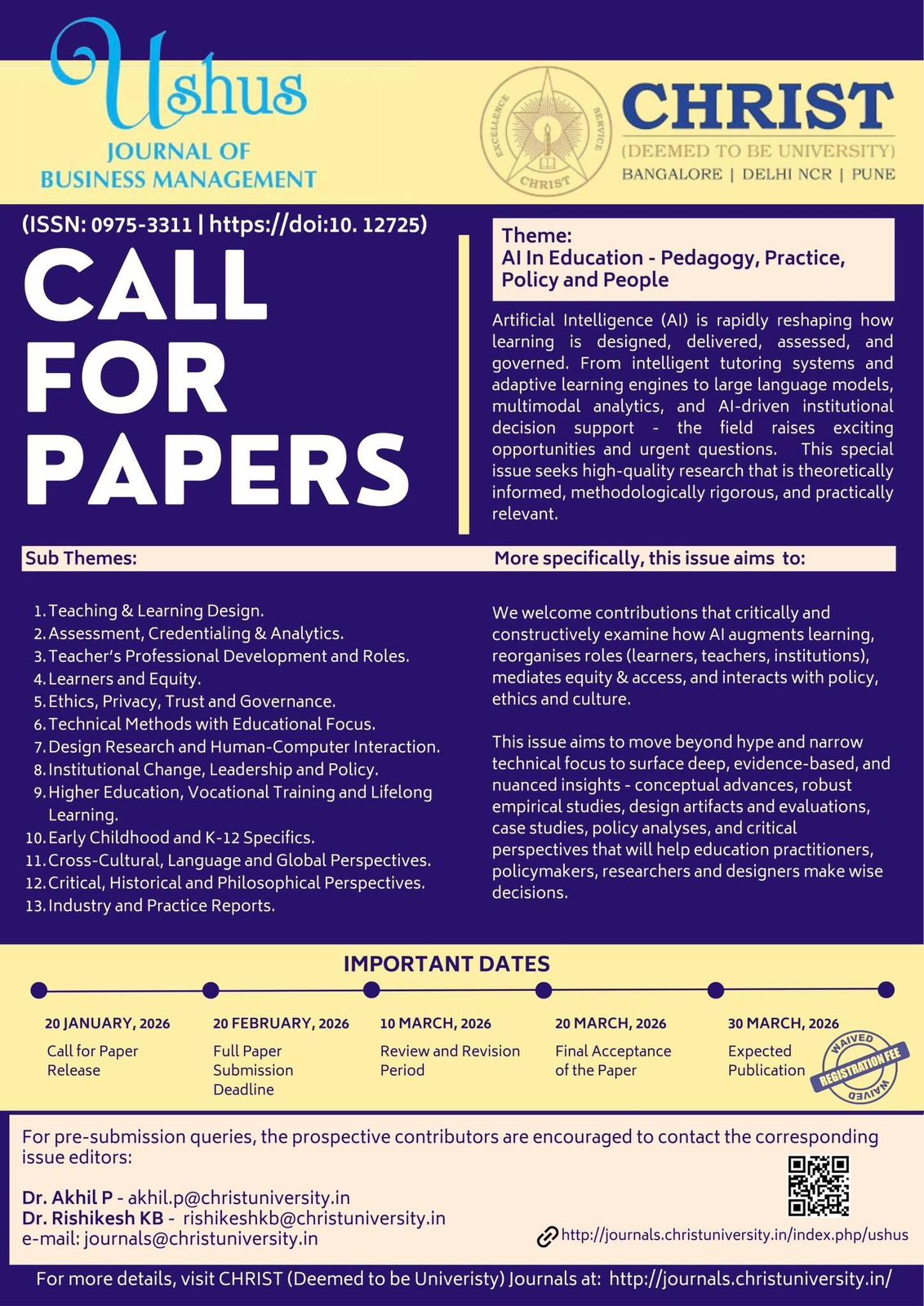Stress and Turnover in the Ed-tech Industry
DOI:
https://doi.org/10.12725/ujbm.66.3Keywords:
job stress, educational technology, turnover, job commitmentAbstract
This research aims to explore the relationship between job stress and intention to leave in the Educational Technology (EdTech) industry, with a specific focus on how job commitment mediates this relationship. The study involved conducting surveys among EdTech employees to gather quantitative data. The results show a significant positive correlation between stress and intention to quit, as well as a negative correlation between job stress and job commitment. Additionally, it was found that commitment partially mediated the impact of stress on intention to quit. The findings highlight the importance of promoting job commitment to reduce turnover intentions resulting from job stress in the EdTech industry.References
Ab Hamid, M. R., Samad, S., & Din, M. (2014). The impact of job stress on turnover intention: A study of academic staff in a Malaysian private higher education institution. Asian Social Science, 10(14), 133-143.
Ahmad, N. H., Hassan, M. R., & Wahid, N. A. (2015). Job stress and its impact on job satisfaction and turnover intention: A study of hotel employees in Malaysia. Procedia Economics and Finance, 31, 654-662.
Akhtar, A., Ahmad, K., & Abdullah, M. (2015). Job stress and turnover intention: The role of organizational commitment and perceived organizational support in nurses. Journal of Nursing Management, 23(5), 588-597.
Al-Hussami, M. (2008). A study of nurses' job satisfaction: The relationship to organizational commitment, perceived organizational support, transactional leadership, transformational leadership, and level of education. European Journal of Scientific Research, 22(2), 286-295.
Altarawneh, I. I., & Alsmadi, M. M. (2020). The effect of job stress on turnover intention: The mediating role of job satisfaction and organizational commitment. European Journal of Management and Marketing Studies, 5(1), 1-11.
Arshadi, N., & Damiri, H. (2012). Job stress, job satisfaction and intention to leave among nurses in Shiraz, Iran. Global Journal of Health Science, 4(2), 109-116.
Aziz, Y. A., & Adnan, H. (2016). The effect of job stress on job satisfaction and turnover intention among employees in banking sector of Pakistan. International Journal of Human Resource Studies, 6(1), 49-64.
Bhatia, S., & Singh, S. (2018). Job stress, job satisfaction, organizational commitment and turnover intention: A study on information technology professionals. Journal of Management and Organization, 24(4), 520-537.
Blau, G. (1985). Job involvement and organizational commitment as interactive predictors of tardiness and absenteeism. Journal of Management, 11(1), 21-29.
Brockner, J., Grover, S., Reed, T., & Dewitt, R. L. (1992). Layoffs, job insecurity, and survivors' work effort: Evidence of an inverted-U relationship. Academy of Management Journal, 35(2), 413-425.
Chen, C. F., & Peng, J. C. (2008). Relationship among hotel employees' job satisfaction, job involvement and organizational commitment. Journal of Human Resources in Hospitality and Tourism, 7(1), 1-19.
Choi, S. L., Goh, C. F., Adam, M. B., & Tan, O. K. (2016). The impact of job stress on employee job satisfaction: A study on employees in the oil and gas industry in Brunei.
International Journal of Economics, Commerce and Management, 4(6), 1-14.
Choobineh, A., Ghaem, H., & Ahmedinejad, P. (2014). The relationship between job stress and turnover intention among Iranian nurses: A questionnaire survey. Journal of Nursing Education and Practice, 4(10), 80-88.
Demir, A. (2016). The impact of job stress on job satisfaction and turnover intention: A study on accounting professionals in Turkey. International Journal of Business and Management, 11(5), 165-175.
Elangovan, A. R., & Xie, J. L. (1999). Effects of perceived power of supervisor on subordinate stress and turnover intention. Journal of Organizational Behavior, 20(3), 359-373
Hom, P. W., & Kinicki, A. J. (2001). Toward a greater understanding of how dissatisfaction drives employee turnover. Academy of Management Journal, 44(5), 975-987.
Huang, C. (2011). Job satisfaction and turnover intention of offshore IT service desk personnel: Understanding the roles of career anchors and job tenure. Journal of Business and Psychology, 26(3), 331-341.
Lee, R. T., & Ashforth, B. E. (1996). A meta-analytic examination of the correlates of the three dimensions of job burnout. Journal of Applied Psychology, 81(2), 123-133.
Meyer, J. P., & Allen, N. J. (1991). A three-component conceptualization of organizational commitment. Human Resource Management Review, 1(1), 61
Downloads
Published
How to Cite
Issue
Section
License
Copyright (c) 2024 Piyush Raj

This work is licensed under a Creative Commons Attribution-NonCommercial-NoDerivatives 4.0 International License.



